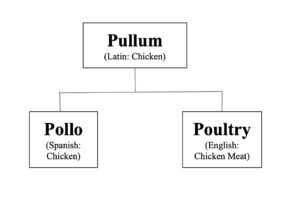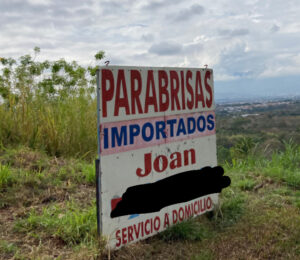Using Etymology to Better Understand Science and Language
One of the defining features of any high level scientific paper is its use of unusual and complex terminology that barely resembles English. Despite how it may seem, scientific terms are not usually arbitrary; they do have some reason for being the way that they are. The key to understanding this is etymology, or the study of the origin of words.
To give a personal anecdote, I had a trip to Costa Rica on the horizon and needed to brush up on my Spanish. Luckily I had a few years of high school Spanish under my belt, so it was mainly a matter of getting comfortable with the basics again. But as I was relearning, I realized that there were many more connections between words than I realized. Instead of trying to remember everything through sheer brute force, I could take “shortcuts” if I only took note of how all these seemingly different words were related.Given that Costa Rica is known for its volcanoes and mountains, let’s use geological terms as examples. Naturally, we should start with the term geology itself. It can be broken down into two parts, geo and ology, as seen in figure one. The first part comes from the Greek word for Earth, and the second, also from Greek, means study of. Therefore, we can understand that geology means study of the Earth.
A more complicated example would be the etymology for volcano. Volcanoes were named after the island Vulcano, a small island near Italy that contains three volcanic calderas. In turn, this island was named after the Roman god of fire and metalworking, Vulcan. Its smoking calderas were thought to be the chimneys of Vulcan’s workshop.Volcano’s origin becomes more of an exercise in geography and history knowledge. However, this can still be helpful information to have, such as with trying to figure out what vulcanizing rubber means. Using the connections from volcano and the mythological figure Vulcan, we can accurately guess that vulcanizing rubber involves a high level of heat. Of course this is not the full definition, as vulcanization is a complex process that involves various chemicals like sulfur to change the rubber at the molecular level. But understanding the origin of the word allows us to better understand how words, even in different languages, are connected.
The goal is not to know exactly how languages evolved and diverged to create the words we have today, but rather to use what we do know to learn and understand new words efficiently. A good trick is to think of words with similar meaning, but vastly different spellings and/or pronunciations. For example the Spanish word pollo has little in common with its English translation of chicken. However, if we think of the word poultry, we can see the connection.

The underlying reason is because Spanish is primarily derived from Latin, while English is derived from old Germanic languages with a smaller Latin influence. Therefore English words will sound and look closer to German, but there are likely some English words that can help us remember the Spanish equivalent. Refer to figure 1 to see how this works with pollo and poultry.
Another word like this is caballo, derived from the Latin caballus. This translates to horse in English, which due to its Germanic roots, is quite unlike the Spanish word. In this case, we can think of cavalry, referring to soldiers on horseback, to help us. Though the v and b may be different, small differences between similar sounds can be overlooked. After all, creating Spanish from Latin took hundreds of years, which gives plenty of time for spelling and pronunciation to slightly drift.
Finally, here is a real life example of how this way of thinking helped in Costa Rica. There was an advertisement, as seen in which said servicio a domicilio. I knew it meant service to something, but I could not figure out exactly what. Domicilio sounded familiar though. While racking my brain, I remembered domicile, the legal term for a permanent home. That means the sign was advertising service to house, or home service in other words.

All photos captured by Donald Shea.
References:
https://www.etymonline.com/word/poultry
https://www.etymonline.com/word/volcano
https://www.etymonline.com/search?q=geology&ref=searchbar_searchhint